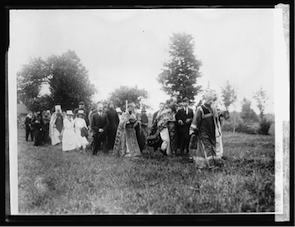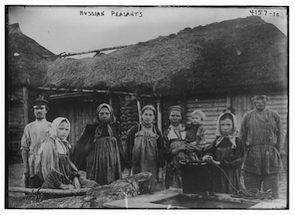

|
The Weakness of Society  Orthodox Church dignitaries The power of the state was only very weakly counter-balanced by an independent landed aristocracy. This was a major difference between Russia and Western Europe, where since feudal days the landowning nobles had limited the power of the monarchy. The Russian nobility was heavily dependent on military and civil service to the state for its position in society and landed wealth. Nor were there many public institutions to challenge the autocracy. Most public bodies (organs of local self-government, scientific and artistic bodies) were in fact creations of the state. Even the senior leaders of the Orthodox Church were appointed by the tsar. The Church retained a powerful hold over rural Russia, in particular. In many villages the priest was one of the few people who could read and write. Through parish schools the Orthodox clergy taught children to show loyalty, deference and obedience, not just to the Tsar and his officials but also to their elders and betters. Despite Alexander II's abolition of serfdom, its legacies continued to oppress the peasants after 1861. Most of the arable land remained the private property of the gentry landowners, who rented it out to the land-hungry peasants at rates that increased steeply in the later nineteenth century as the population rose. Legally the peasants were excluded from the sphere of written law, which protected property.  Russian Peasants Their affairs were regulated by customary law within the village commune (mir or obshchina), which was dominated by the patriarchal culture of the peasant elders, mostly devoted to the 'Tsar-Batiushka' or paternal Tsar, until the turn of the twentieth century when a younger and more literate generation of communal leaders emerged. These peasant sons would play a vital role in the revolutions of 1905 and 1917. Gentry magistrates dominated the administration of the countryside. Until as late 1904, they retained the power to have peasants publicly flogged for minor misdemeanours, such as rowdy drunkenness or trespassing on the landowner's land. It is difficult to overestimate the psychological impact of this corporal punishment - 43 years after the serfs had legally been 'freed'. Issues of human dignity were prominent in 1905 and 1917. The memory of serfdom was still fresh. |
© 2014 Orlando Figes | All Rights Reserved